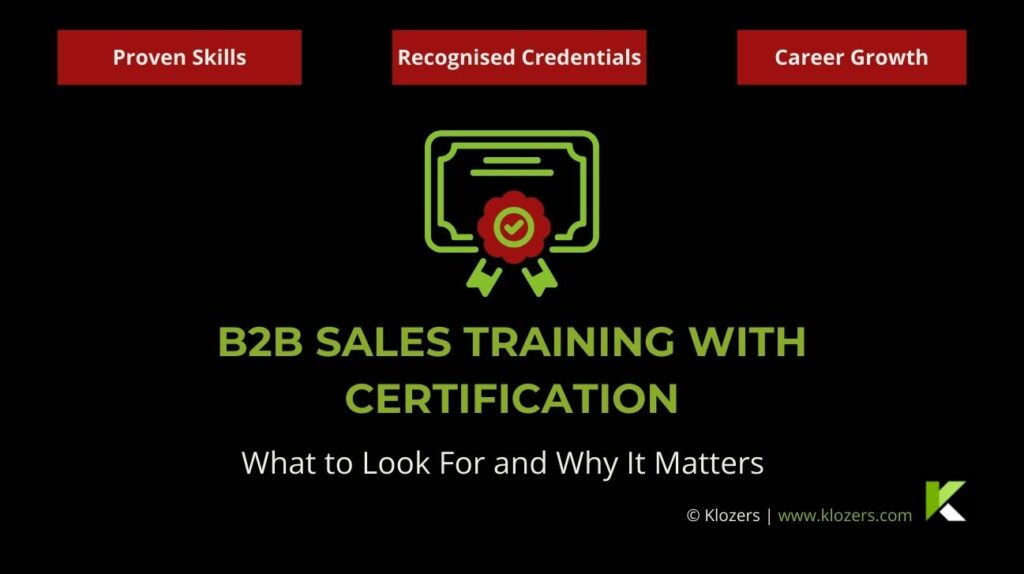B2B sales training with certification - Top Question FRom Google
What is B2B sales training with certification?
B2B sales training with certification is a structured program that teaches sales skills tailored to business-to-business selling and awards a certificate upon completion. It is used to validate a salesperson’s abilities, support career growth, and help get everyone on the same page when it comes to how the team sells.
A well-designed training program can make a real difference. According to Accenture, businesses have seen over 350% ROI when they get the sales process right. That kind of return does not just lift company revenue, it also helps reps close more deals and earn more in the process.
Free access to our best tools and templates
Introduction: B2B sales training with certification
Selling in a B2B environment can be a completely different game from selling in a B2C environment. In most B2B sales today, you are not just selling to one person. You are dealing with an average of 11 stakeholders, each bringing their own goals, concerns, and level of influence to the table. You need to convince procurement, finance, IT, legal teams, and senior leadership to get a single deal closed. These teams would have also done their homework, reviewed vendors, compared solutions, and narrowed down their options. So by the time they talk to a salesperson, they are not looking for a basic pitch. They are looking for someone who understands their challenges and can offer real guidance.
That’s why the role of the B2B salesperson has evolved. It is no longer just about knowing your product and pitching features. You need to understand the business behind the deal, guide multiple stakeholders through the process, and help them see how your solution fits into their needs. To support this shift, more companies are turning to structured B2B sales training to build standardized sales practices that every member of the team can adopt. B2B Sales training with Certification also shows that a salesperson has absorbed this training, practiced it, and proven they can apply it in real conversations.
That said, not all training programs are created equal. The best programs are hands-on, tailored to specific roles, and built around the real challenges reps deal with daily. They provide practical tools, coaching, and exercises that sales representatives can apply in their deals. If you are thinking about investing in training, it is worth taking the time to look closely at what is being offered.

What Good B2B Sales Training with Certification Should Cover
- Prospecting and Lead Qualification: This is the first step in the sales process, where you identify potential customers and decide which ones are worth pursuing. Good B2B sales training programs will show you how to figure out who your most likely buyers are and spot signs that they’re ready to buy. You will also learn how to qualify leads using proven methods like MEDDIC, BANT, or CHAMP. The goal is to help you and your team focus on the deals that are most likely to go somewhere, so time and energy are not wasted chasing the wrong ones.
- Discovery and Building Value: Discovery is the part of the sales process where you understand your buyer’s challenges, goals, and what’s behind their interest in your solution. This stage lays the foundation for building trust and showing real value. Great B2B sales training teaches you how to ask thoughtful, meaningful questions that will reveal the reasons behind the buyer’s decisions, what risks they are trying to manage, and what success looks like from their perspective. When you have that deeper insight, you can position your solution as something that truly solves problems and delivers results, not just another product with features.
- Managing Multi-Stakeholder Deals: B2B sales training helps you to work through the challenges of selling to multiple people, showing you how to spot the decision-makers, understand what matters to each of them, and keep everyone aligned throughout the process. You will learn how to manage competing agendas and lead productive group meetings.
- Handling Objections and Pricing Pressure: Objections are part of the selling process and a sign that a deal is getting serious. The right B2B sales training will teach you how to listen closely, get to the root of concerns, and respond in a way that’s both thoughtful and clear. When it comes to price, you will learn how to defend your value confidently instead of jumping straight to a discount.
- Closing and Growing Accounts: With a good B2B sales training program, you will learn how to bring deals to a close by making sure everyone is still on the same page and answering any final questions. Additionally, since B2B sales don’t stop at the first deal, strong training also shows you how to keep growing the relationship through renewals, upsells, or cross-sells and by building on the value you’ve already delivered.
Technology Integration in Modern B2B Sales Training
Technology has completely changed the way B2B sales training is delivered and what it needs to cover. The best sales training programs today go beyond selling techniques to include hands-on training with tools like CRM systems, sales engagement platforms, and analytics software. When your team knows how to use these tools well, they can make smarter, data-backed decisions throughout the sales process.
You should also make sure training is balanced. It should help your team build confidence with digital tools while still focusing on the core of great sales, which is building relationships. As more sales teams bring AI into their workflows to increase their productivity, it is also important that training covers how to work effectively alongside AI, not be overwhelmed by it.
What to Expect from a B2B Sales Certification Program
Most B2B sales certification programs follow the same practical and flexible learning structure. You get a mix of self-paced lessons and live sessions, so your team can learn in a way that fits their schedule and how they learn best..
Expect real-life case studies, role-play scenarios, and interactive assessments that help your team apply what they are learning. Many programs wrap up with a final project or test to make sure the knowledge sticks and to earn that certification. Once complete, participants typically receive a downloadable or verifiable certificate they can add to their CV or LinkedIn profiles.
When choosing a program, make sure it fits the way your team learns. If your reps are juggling busy schedules, short self-paced lessons might be a better fit. But if you are aiming for team alignment and shared language, live group sessions can create stronger engagement and consistency.
What to Avoid in B2B Sales Training with Certification
Sales certifications can look great on paper, but not all training programs deliver the kind of value your team needs in the field. Here are a few red flags to keep in mind:
- Not Enough Real-World Application
If the training is full of abstract theories or motivational fluff but does not reflect the actual flow of a sales conversation, it won’t stick. Your team needs practical, hands-on content that mirrors what they deal with every day, from prospecting to handling objections and closing deals. Without that, it may be hard for your team to connect the training to their day-to-day work. - Generic, One-Size-Fits-All Content
B2B sales are not the same across industries. Selling a software platform to a hospital looks very different from pitching logistics services or enterprise tools. If a course claims to “teach you how to sell anything,” it probably doesn’t go deep enough into the real challenges, like sales processes that take months or selling to a team of experts who need to approve the technical details. Your team should be learning strategies that match the kinds of deals they’re working on. - No Way to Practice or Get Feedback
If all it takes to earn the certificate is clicking through slides or watching a few videos, you are just collecting content. Good training gives your reps a chance to practice, get feedback, and show they understand the material. That could mean role-playing, live coaching, or performance assessments. Without those checkpoints, there’s no way to tell if the learning is effective.
Final Thoughts
B2B sales are not what they used to be. Buyers are more informed, harder to engage, and more cautious about where they spend their budget. If your team is going to succeed in this environment, they need the right kind of training to keep up, stand out, and close deals with confidence.
You should think of sales training not as a one-time workshop, but as an ongoing, data-driven strategy. The most effective programs give reps the tools and skills they need to manage long sales cycles, multiple decision-makers, and meet buyer expectations. When you invest in training that truly meets your team’s needs, you will be able to see stronger customer relationships and faster revenue growth. It is important to remember that top-performing sales teams are intentionally built with the right strategy so they can learn faster, sell smarter, and stay ahead of the competition.
ACTIONABLE TIP
Actionable Tip:
Before choosing a certification program, ask for a sample module or trial session. This lets you see if the training uses real-world scenarios, interactive coaching, and assessments, not just theory. A quick preview helps you avoid wasting time on generic, one-size-fits-all courses.




